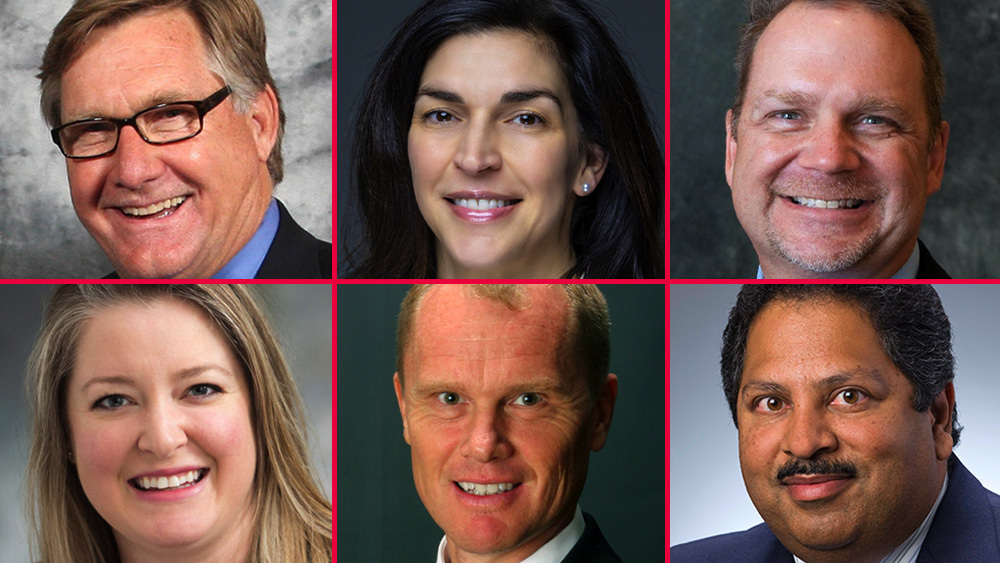
The ocean and coastal engineering industries are changing. With the introduction of new and emerging technologies and policies, the energy transition and the rise of blue economy (the sustainable use of ocean resources for economic growth, improved livelihoods and preservation of the ocean ecosystem), the future is filled with possibilities. And endless questions.
To help bring clarity to how industry is tackling the challenges it is facing and to share insight on where it is going, the Department of Ocean Engineering at Texas A&M University hosted a virtual industry panel with six former students.
The panel included: ocean engineering former students Sarah Dearing ’08, vice president at Callan Marine; Arun Duggal ’92, chief of technology at Specialized Offshore Facilities and Engineered Components Inc.; Bill Hanson ’79, senior vice president at Great Lakes Dredge and Dock Co.; Richard Meserole ’86, senior vice president at Fluor; and Stein Rasmussen ’93, chief strategy officer at Single Buoy Moorings Offshore; and maritime systems engineering former student Paula Fitzpatrick ’98, vice president of growth and development at Wood.
Dr. Sharath Girimaji, ocean engineering department head, kicked off the event with a departmental update and formal welcome to the 83 audience members.
Overall, the panelists agreed, the future for ocean engineering is vast.
“The ocean engineering program provides you a foundation,” said Duggal. “You, as a person, get to figure out how to use it based on your interests and where the industry leads you.”
With the increased size of ships and the recent events that blocked the Suez Canal, the dredging experts — Hanson and Dearing — predict a need around the world for a widening and deepening of ship channels and canals. Noting that their field is already experiencing a marketing boom, they explained that such aid to the international trade industry is one element in how ocean engineering has worldwide applications.
The energy professionals — Fitzpatrick, Meserole, Duggal and Rasmussen — fielded questions about the transition to renewable resources and whether it would ever be a field that has a larger market share in the future.
Fitzpatrick set the stage, asserting that if the technology catches up to the vision for renewables, she believes it will be as profitable as traditional forms of energy.
Meserole and Rasmussen added that companies are already shifting to a greener outlook due to government and public pressure to reduce their carbon footprint.
“If you just take the U.S., specifically, the infrastructure required to make those changes is an industry unto itself, and those industries have to be able to be supportable, whether its offshore, whether its onshore or wherever,” said Meserole “I think the time is really exciting in our space because the transition is going to continue to happen.”
Moving to the coast and climate change, Hanson and Dearing explained how dredging continues to play a part in helping coastal communities and those at risk of being displaced by rising sea levels.
“It’s about developing good solutions that are buildable and also we have to consider the long-term impacts,” said Hanson. “I’ve already been on three calls this morning talking about the environmental impacts of dredging and how we can mitigate some of those or even enhance some of the natural infrastructure by rebuilding some of the shorelines.”
From coast to offshore, the panelists looked toward the horizon by considering where they believe the next expansion in ocean engineering will be. Their answers aligned, automation and digitalization of engineering, decarbonization, public image and renewables.
“I can still remember when I was still a student on my first day of college in Norway, there was a professor that came in and he said, ‘If you think that in the journey that you start now, you’re finished learning after these three years, you are wrong,’” said Rasmussen. “And for a split second, I was thinking, ‘Okay, this isn’t the right place for me.’ But it’s true, you have to learn every day throughout your career.”
These comments were part of a larger conversation. For a full video version of the panel, please contact Meredith Brown.